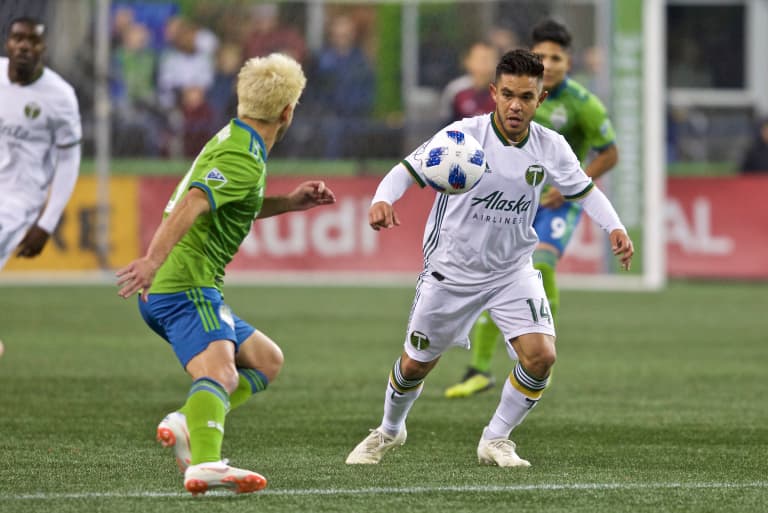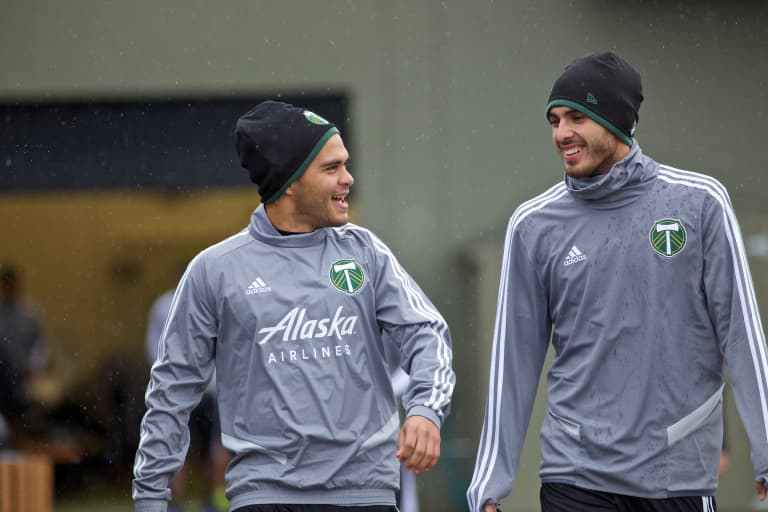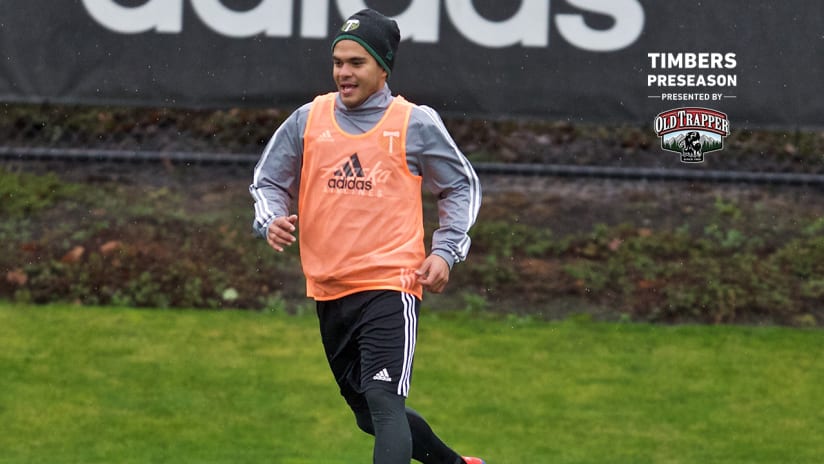BEAVERTON, Ore. – From the outside, the process is far different. “How do they stand out,” is often the implied question, when fans try to evaluate players. What makes them special, how are they distinct, and what can this player offer my club?
They’re questions that reflect one perspective, a different context than how coaches see their squads. So often, technical staffs view their soccer lives in terms of problems and solutions, a reality that crafts an entirely different set of queries: Where is my team lacking? How do we address it? And in terms of where we’re strong, how do we get even stronger?
The divide between those sets of questions aligns perfectly with perceptions of Andrés Flores. From the outside, the Salvadorian international was a role player on last year’s Portland Timbers, somebody whose 26 regular-season appearances and one postseason start reflected a functional place in his team’s squad. For a debut season in Major League Soccer, it was a strong start, even if his time in the North American Soccer League (with New York Cosmos), regular place for his national team and a pedigree that includes South American titan River Plate in his development lineage said he was capable of as much. He may not have a standout skill that provides easy answers to how, from the outside, he stands out, but on the flip side of that coin – his versatility, as well as his lack of weaknesses – we see another view of his profile.
That’s why “Ruso” – a nickname he picked up on international duty – felt more than functional. It’s part of that difference between a fanatic and manager’s viewpoints, one that was evident in some of last season’s most important moments.
When facing their first major test of the 2018 season – a game seven visit from a then-undefeated New York City FC – Flores, surprisingly, found his name in the starting lineup, selected to do a specific, necessary midfield job by the same head coach (Giovanni Savarese) that relied on him with Cosmos. In the postseason, when the midfield duo of Diego Chara and David Guzmán was broken up by a Guzmán injury, Flores was chosen to partner with Chara in Seattle, helping a team that advanced to the MLS Western Conference Championship.
There were other performances, too. And other roles. Being chosen in New England as the transition game’s focal point, when Savarese heavily rotated his first XI. Starting in June’s road game in Seattle, at a venue where the Timbers had previously never won in regular-season play. Even in hindsight, they’re selections that give you pause. “That’s right. Ruso started those games.” But in those selections, Flores’ role reflected his coaching staff’s trust.

“That was a very difficult game,” Flores remembers, when asked about his conference semifinal performance in Seattle. “We had to defend constantly, and keep Seattle in areas where they couldn’t be so dangerous.”
Flores is one of many Timbers who slide between Spanish, his native language, and English, doing so with ease. He’s shifted to Spanish, now, having finished five minutes with the English-language media, but his approach in both languages is the same. Here, he’s been asked about himself: whether his performance in a derby of derbies – an elimination game between Portland and the Sounders – helped his confidence. When asked what he remembers, though, he begins with the team.
“I remember Diego (Chara) did so much work. He was really strong in keeping possession and making sure our defense could stay calm.”
Finally, he’s willing to say something about himself, even if he demurs from grading his own performance.
“For me, and for my mindset, it meant a lot, because we moved on. I hope I have more opportunities to do something like that this year, because I want to be part of those moments.”
It’s in his choice of words that Flores betrays himself, even if those words could have come from any player’s lips. He was a vital part of the team’s Seattle performance, starting and playing the principle role as Portland’s two-man midfield had to offset numbers against Seattle’s central trio (Osvaldo Alonso, Nicolás Lodeiro, Gustav Svensson) as well as an in-cutting winger (Harry Shipp). In typical Flores fashion, he didn’t do anything that detracted from the team’s goals and, in that way, also failed to draw many accolades. But from the perspective of a coach looking for solutions –a player who could keep the team on course – Flores proved an ideal solution.
It’s why players like Baggio Husidic and Michael Stephens, in given years, proved so valuable to Bruce Arena’s LA Galaxy dynasty of the early 2010s. For Toronto FC’s recent, back-to-back Eastern Conference champions (2016, 2017), they were younger players with room to grow, like Marky Delgado and Jonathan Osorio. The Houston Dynamo teams that won titles in 2006 and 2007 had players like Brian Mullan who could serve the purpose. In a salary-capped league, stars are going to dominate a team’s budget, but even in today’s Allocation Money era, teams need their Flores’ to play a part.
Pick any other sport, and you’ll see other Rusos. Even an NBA juggernaut like the Golden State Warriors has needed players like Shaun Livingston – a reserve point guard who’s now played a part in three titles. They may not be the first names in the lineup, but in a team environment, the role players are indispensable.

What complicates Flores’ picture are the different questions – the curiosities that divide the inside and out. Within a coaching staff, there isn’t much debate as to Flores’ value, though even that state overlaps with an outsiders’ view, eventually. Flores was out of contract with the Timbers at the end of the 2018 season, and while the team was in constant pursuit of a new deal, there is an implicit question beneath every contract negotiation: How much does the club feel the player’s worth?
Eventually, Flores and the Timbers settled on a new deal, one that grants him an opportunity to build on 2018’s progress. 2019, though, is not 2018, and with a new year comes a new set of challenges. Whereas last season marked a time of transition for so many Timbers, there’s firmer ground under the paths of players like Flores, Cristhian Paredes, and Eryk Williamson. They know what’s expected from them, and after a year under Savarese and staff (a first year, for most), they’re better equipped to challenge Chara and Guzmán. Add Venezuela international Renzo Zambrano to that mix after his elevation from T2, and spots in Portland’s double pivot will be more contested than ever.
So how does Flores stand out from players like Paredes, Williamson and Zambrano? Strangely and counterintuitively, that may be the wrong question to ask. Whereas most players make their names by distinguishing themselves from their competition, augmenting his teammates may be what separates Flores most.
“I think, here, Gio and the coaching staff do a lot of good work to make sure [the midfielders] are complementing each other,” he says, turning the question from what distinguishes his skillset to an examination of the group’s strengths. “They want players like Diego Chara, Eryk, Renzo, everybody to be able to offer something different. They complement me well, and I’m a really strong complement to them …”
Finally, Flores says something about himself.
“No person is going to give more than me,” he says, believing that’s how he “fits into the group. That’s what I have to offer.”
Flores is more than a nice guy. He’s more than a personality. He wants to be a “tougher” player this year – harder, in soccer parlance. It’s a goal that reflects the lessons of year one. Technically and tactically astute, Flores is truly a player without a significant weakness, but in lieu of being able to physically overwhelm anybody (Ruso measures out at 5-foot-6), he can still make their lives hard.
“I want to be a player who can take the experience I earned last year and apply it to what I’m doing this year,” he said, when asked how 2018 Flores can be different than his 2019 version. “This year, I want to leverage the confidence (from 2018) and take that to the field in every moment of every game – use last year to become, this year, even more important to the team.”
On the scoresheet, there’s no column for fit. There’s no column dedicated to being “even more important.” But as Flores showed in his Portland debut, the ability to complement teammates has real value. From a distance, that might not be a distinguishing force, but with a closer look, that’s what makes Flores truly stand out.












